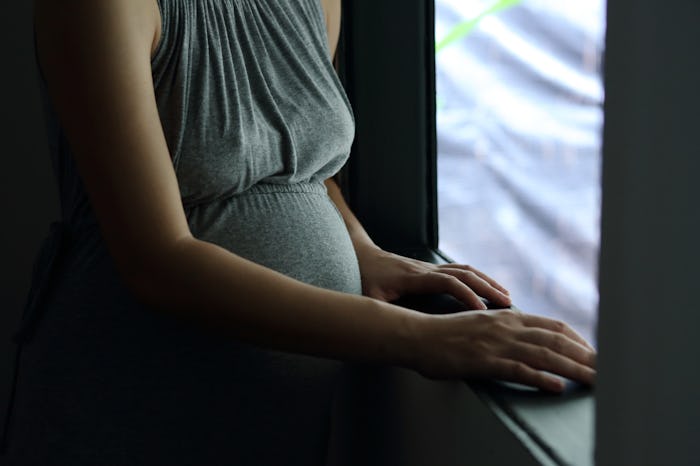Life

Here's What An OB-GYN Wants You To Know About Depression During Pregnancy
For most women, pregnancy comes with its own set of demons. Women can experience a range of issues during pregnancy including body aches and pains, skin conditions, weight gain, and hormonal fluctuations. But if you are suffering from the blues during your pregnancy — blues that you just can’t seem to shake — you may be concerned. You have heard of postpartum depression, but what about during pregnancy? Can pregnancy cause depression?
Romper reached out to Dr. G. Thomas Ruiz, OB-GYN at MemorialCare Orange Coast Medical Center in Fountain Valley, California, who says that while pregnancy itself may not be the cause of depression, if you have an underlying depression diagnosis, it can be exacerbated by pregnancy. He explains that while the hormone mechanism of this action is not well understood, antenatal depression (the name for depression during pregnancy) can be associated with increased risk of negative pregnancy outcomes including operative deliveries, spontaneous abortion, bleeding, and preterm birth.
A Washington Post article noted that prenatal depression is a mood disorder that involves the changes in your brain’s chemistry. The hormonal changes during pregnancy can affect the chemicals related to depression and anxiety in your brain, so if you are suffering from difficulties in your life, including anxieties related to your pregnancy, it could turn into depression.
The symptoms of prenatal depression can be persistent sadness, anxiety, hopelessness, sleep issues, loss of interest in your favorite things, thoughts of death and suicide, difficulty concentrating, feelings of guilt, lack of self worth, and changes in your eating habits — all lasting for two or more weeks. If you feel any of these symptoms, it’s time to call your doctor so that you can be evaluated and treated if necessary.
Dr. Ruiz tells Romper there is a study showing that antidepressants like SSRIs (selective serotonin reuptake inhibitors) can be an effective treatment for moderate to severe depression symptoms during pregnancy. However, he says that certain antidepressants can increase the risk of teratogenicity (abnormal development of the fetus) if taken in the first trimester. Ruiz explains that Paxil may be the highest risk SSRI, but the study numbers are small and have not been well replicated. “If the patient develops major depression in pregnancy, first line therapy is with SSRIs,” he says, “and the benefits of treatment are found to outweigh the risk of birth defects.” Ruiz adds that mild to moderate depression can be also be managed with psychotherapy if needed.
Women who are experiencing mild to moderate depression during pregnancy can also try and manage symptoms with the help of support groups, but if she is dealing with severe depression, she may need a combination of psychotherapy and medications.
In an interview with Romper, OB-GYN Dr. Adrienne Zertuche of Atlanta Women's Healthcare notes that as many as 10 to 15 percent of pregnant women suffer from a mental disorder, including new onset or recurrence of depression or anxiety. She says that these conditions may be less likely to be recognized and diagnosed during pregnancy, so pregnant women with mental illness do have an increased risk of poor outcomes for both mother and baby.
The best thing you can do if you are feeling down is to talk to your doctor. They can give you a treatment plan that is right for you and your pregnancy, and that will be safe for your baby. Talk to your family and friends and ask for help if you can, too. You shouldn't be ashamed or embarrassed by how you are feeling and you deserve to be as healthy and feel like yourself. Just know that what you are feeling is not your fault and with some treatment, you’ll be feeling better in no time.
Experts: